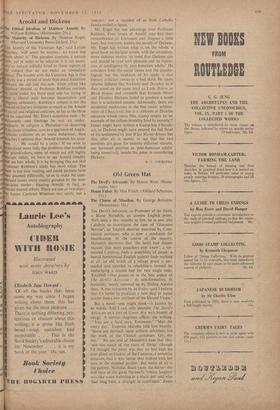Arnold and Dickens
h ti
the Ethical Idealism of Matthew Arnold. By William Robbins. (Heinemann, 25s.) history of the Victorian Age,' said Lytton Strachey, 'will never be written : we know too Nell about it.' The paradox contains a certain yet in order to be selective it is not neces- lary to remain wilfully blind to those aspects of Plir subject that do not make an immediate Ppeal. The trouble with the Victorian Age is that n really was a period of more than usual transition etween the old and the new, when critics like Matthew Arnold, as Professor Robbins reminds S. came under fire from each side for trying to Steer a liberal path between materialism and religious orthodoxy. Robbins's subject is not the .ti Arnold of literary criticism so much as the Arnold -11,1of social and religious criticism, so far as the three 11 tan be separated. Mr. Eliot's notorious view—ln
,_
Ohilosophy and theology he was an under- leograduate; in religion a Philistine'—is deserving 10 no more attention, save as a specimen of Anglo- ) (atholic criticism on its worst behaviour, than DOStrachey's opinion that 'Arnold mistook his voca- He would be a critic.' If we wish to
rlderstand more fully the problems that troubled
bur grandfathers, some of which are still highly relevant today, we have to see Arnold steadily kiid see him whole. It is by bringing this out that Professor Robbins's study has most value. The book is not easy reading and could perhaps have been planned differently, so as to make the com- l.', Phcated issues more readily grasped by the non- b"Ilecialist reader: treating Arnold, in fact, as !'11' Arnold treated others. There are one or two slips: Ahe future Cardinal Wiseman was surely not a
'convert,' but a member of an Irish Catholic family settled in Spain.
Mr. Engel has one advantage over Professor Robbins. Even lovers of Arnold may find their remembrance of Literature and Dogma a little hazy, but everyone knows the novels of Dickens. Mr. Engel has written what is, on the whole, a good book on the later novels, with the secondary, more dubious motive 'to insist that Dickens can and should be read with pleasure and no restric- tion of intelligence by post-Jamesian adults.' He considers both the social issues and the psycho- logical, but the weakness of his study is that literary criticism comes in a bad third. He treats relative failures like Nickleby and Dombey as if they stood on the same level as Little Dorrit or Bleak House, and contend S that between Oliver and Dombey Dickens failed to produce a novel that is a sustained success. Admittedly, there are incidental weaknesses in the fine comic achieve- ment of Chuzziewit, but is a criticism of Dickens adequate which treats Mrs. Gamp simply as 'an example of the callous brutality bred by poverty'? James might have written a Gamp-less Chuzz/e- wit, as Dickens might have poured the full flood of his sentimentarity into What Maisie Knew; but this, after all, is merely to say that the two novelists are great for entirely different reasons, our favoured position as 'post-Jamesian adults' being complztely beside the point in considering Dickens.
R. C. CHURCHILL










































 Previous page
Previous page